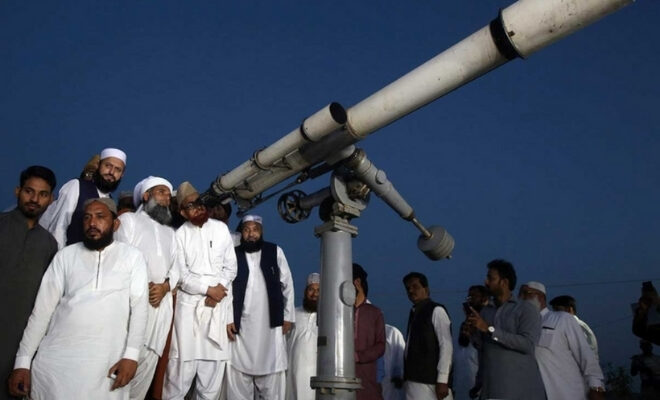Beginning Ramadan when the Moon is Sighted in Any Country

Eid-ul Fitr is a special time to celebrate with our friends and family, exchange gifts with one another and send our Eid greetings far and wide. Indeed, it is one of special occasions in which the Ummah feels a sense of unity due to our collective experience of fasting and engaging in worship during the holy month of Ramadan.
However, when we see Muslims taking part in Eid on different days even in one country and one city, we begin to lose the sense of unity as a global ummah.
Is the starting of Ramadan or the announcement of Eid based on Global sighting or local sightings? Should we just use the majority as the measure or follow the lead of one’s country?
What is the correct understanding according to the Islamic evidences?
What About the Majority?
Today some people argue that we must follow what the majority are practicing, they attempt to misquote Islamic texts about “Holding on to the Jama’a” and they misinterpret these to mean the ‘Jumhoor’ ‘majority’.
This actually refers to the jama’ah of Muslims under an Imam (Khalifah) not to the majority.
Hence the Prophet (saw) advised Huthaifah to:
“Adhere to the Jama’ah of Muslims and their Imam” when the times of great tribulation arrive (narrated in a long hadith by al-Bukhari).
It also contradicts many evidences about enjoining the good and forbidding the evil even in the face of hardship, the Prophet (saw) said:
“The master of martyrs (sayyid al-shuhada) is Hamza, and a man who stands up to a tyrant ruler and gives him nasiha (advice). And so the ruler kills him.”
To follow the Majority can also refer to those who adhere to the correct Islamic position even if it is a minority, as expressed in the narration of Ibn Mas’ud (ra) where he said, “The Jama’ah is the Truth (Haq) even if it is one person”.
This shows that following the Jama’ah is not a numbers game about following those who are in the majority. Thus the concept of following the majority rather than following Islam is not based on evidence from the Quran and Sunnah.
What about Unity?
The disease of Nationalism has affected us. Why is it that people follow only the sightings of their town/city/country, and disregard the sightings of their fellow brothers and sisters who share the same faith in other places? Do we not trust and respect each other’s word?
The Messenger of Allah (saw) said:
“He is not one of us who calls for ‘asabiyyah, (nationalism) or who fights for ‘asabiyyah or who dies for ‘asabiyyah.” [Abu Dawud]
What we find happening in modern times is that the local sighting position is adopted by some but implemented on the basis of false political considerations instead of correct Islamic injunction. They justify using the political boundaries imposed on the Muslims by colonialist powers as separate regions for sighting the crescent.
The rulers in the Muslim lands are agents of the disbelieving Western powers. They want the Muslim lands to remain divided and for the Muslims to show no sign of unity based on Islam. This is why we have a farcical situation whereby all the countries in the Middle East go by their own sightings even though most of them would come under the same region.
And the opinion of fasting according to a particular country is totally invalid and rejected from its foundation.
Local/Regional Sighting in Practice
Some Muslims use local sightings as the basis of the starting and ending of Ramadan.
The reality is that the local sighting opinion is a weak opinion that could have been applicable in the past when there was difficulty in establishing the reality of a united moonsighting in their time, the difficulty in instant communication between vast regions at the time, or due to the remoteness of some lands or lands cut off from the rest of the world for some reason (i.e. due to natural disasters) so the people will not be able to find out the moonsighting around the world and will have to depend on their own local/regional sighting.
Some scholars deduced from the narration reported by Muslim on the authority of Kurayb who reported that Umm- ul-Fadhl Bintu-l-Harith sent him to Mu’awiya in Al-Sham; he said:
“I arrived in Al-Sham and did business for her (Umm-ul-Fadhl Bintu-l-Harith). It was there in Al-Sham that the month of Ramadhan commenced. I saw the new moon of Ramadhan on Friday. I then came back to Madina at the end of the month, Abdullah Ibn Abbas (R) asked me about the new moon of Ramadhan and said: “When did you see it?” I said: “We saw it on the night of Friday,” He said: “Did you see it yourself?” I said: “Yes, and the people also saw it and observed the fast and Mu’awiya also observed the fast; whereupon he said: “But we saw it on Saturday night.” Some would continue to observe fast till we complete thirty (fasts) or we see it (the new moon of Shawwal).” I said: “Is the sighting of the moon by Mu’awiya not valid for you?” He said: “No, this is how the Messenger of Allah (saw) has commanded us.”
Some argue that Ibn Abbas ignored the sighting of the people of Al-Sham and that the people of each region are commanded to act upon the sighting of the new moon in their region only and not in other regions, thus the beginning of fast and the beginning of Eid vary from one region to another and according to the times of rising.
The answer to this claim lies in the fact that this report is not a Hadith of the Messenger of Allah (saw) but the Ijtihad of a Sahabi, which is not comparable to the Hadith of the Prophet (saw). As for the saying of Ibn Abbas at the end of the report:
“This is how the Messenger of Allah (saw) commanded us.”, it is not a Hadith but merely the way Ibn Abbas understood the Hadith of the Messenger of Allah (saw).
Therefore, what Kurayb has reported does not qualify as a Hadith but remains an opinion of Ibn Abbas which does not qualify as evidence.
Using Prayer Times to Justify Different Moon Sightings
Some people claim that the people should follow their own times regionally as they would like the times of prayer.
The prayers are subject to their scheduled times and these are different even in the one region. This is used to compare to the time of Imsak (beginning of fast) at dawn and at the time of Iftar (end of fast) just after sunset. The Imsak and the Iftar times differ from one place to another just like the times of prayer, which also differ from place to place, but this difference happens in one single day.
The beginning of the month of fasting must begin on the same day all over the whole world, and the difference occurs only in the parts of the single day.
This is what the texts of the Ahadith have clearly indicated; and this is what is confirmed by the understanding deduced from the Shari’ah rule.
Therefore, the month of fasting begins for the Islamic Ummah all over the world on the same day and the end of the month of fasting and the beginning of Eid also occurs on the same day for all the Islamic Ummah all over the world.
Global Sighting
Bukhari and Muslim reported that the Messenger of Allah (saw) mentioned said:
“Fast when you see it, and break your fast when you see it, and if the weather is cloudy do calculate it (the months of Shaban and Shawwal) as thirty days.”
The verb ‘Sumu’ ‘Do fast’ is in the plural form that includes all Muslims all over the world.
Furthermore, the word ‘Ruayateh’ ‘sighting’ has also come in a general form: “When it is sighted” or “If it is sighted.”; this means that it includes any sighting, and it does not merely apply to the person who sights the new moon, nor does it specifically apply only to the people of his own country, for the address which orders the fast and the breaking of the fast is general and comprehensive, as is the address concerning the sighting, therefore, the rule is undoubtedly general.
The command is not for individual Muslims to sight the moon and then begin fasting or to make Eid based upon their personal sighting. Even the Prophet (saw) used to begin fasting when he had not personally seen the moon, but a Muslim had reported to him that they had seen it.
Ibn Umar (ra) reported,
“During the time of the Prophet (saw), the companions went looking for the new crescent. So I told the Prophet (saw) that I saw it. So he fasted and told the companions to fast.” [Abu Dawud & Hakim]
During the lifetime of the Messenger of Allah (saw), the Muslims used to begin the fast on the same day and break it on the same day despite the fact that they lived in different areas.
The hadith amongst others are very clear and unequivocal, in them the Messenger of Allah (saw) orders us to fast when the sighting of the new moon of Ramadan is confirmed, and break the fast when the sighting of the new moon of Shawwal is confirmed.
Therefore, the Shari’ah rule states that if the people of one country sighted the new moon, it would be exactly as if all the Muslims have sighted it as well, therefore they should all fast if it is the new moon of Ramadan, and they should all break the fast if it is the new moon of Shawwal.
True Unity is under the Khilafah State
The true unity of the Muslims can only be achieved under the Khilafah. The adoption of the Khalifah is what removes the differences of opinion.
Until the Khilafah is re-established, there will not be any unity in the matter of Ramadan, let alone other more important matters. Any claims of unity have to therefore be considered in light of this fact.
Moving from one position (town/city) to another will not achieve any unity. Nor will following ‘the biggest mosque’ or ‘the biggest community.’ The unity of the whole Ummah is the objective. The global sighting position, on top of being the strongest opinion, is most conducive to this.










